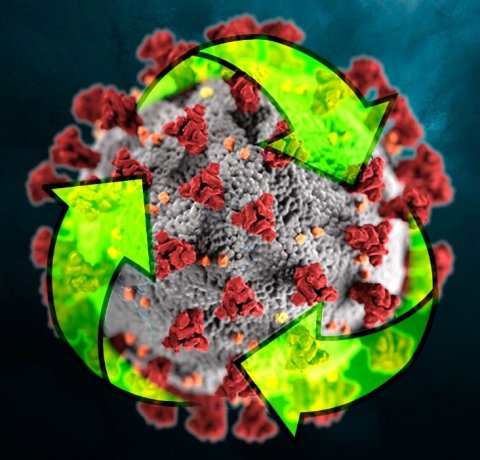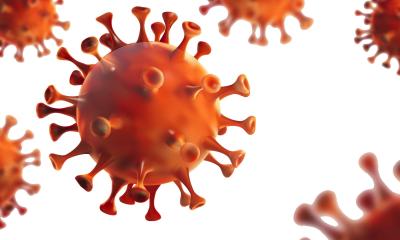News • Study hints at increased risk
Many Covid-19 patients return to hospital within 140 days
People discharged from hospital after Covid-19 appear to have increased risks of diseases across multiple organs and nearly a third are readmitted to hospital in the following months, according to a new study co-led by researchers at University College London.

Image sources: Jeremy Bishop on Unsplash (Background); Clker-Free-Vector-Images from Pixabay (Arrows); Centers for Disease Control and Prevention (CDC)/Alissa Eckert, MS; Dan Higgins, MAM (Virus); Mashup: HiE/Behrends
The study, published in The BMJ, looked at nearly 50,000 people who were discharged from hospital by August last year and compared them to a control group who were matched according to personal characteristics and 10 years of medical history.
Over an average follow-up of 140 days, patients discharged after Covid-19 had higher rates of respiratory disease, cardiovascular disease and diabetes (six, three and 1.5 times greater respectively) than similar individuals in the general population. During the same period, nearly a third of individuals were readmitted to hospital (14,060 of 47,780) and more than one in 10 (5,875) died.
Senior author Dr Amitava Banerjee (UCL Institute of Health Informatics) said: “Our study shows the substantial long-term effects of acute Covid-19. As the effects are seen across multiple systems, the diagnosis, treatment, and prevention of post-Covid syndrome are likely to require integrated rather than organ- or disease-specific approaches.” National statistician Sir Ian Diamond, co-author of the paper, said: “The increase in risk was not confined to the elderly and was not uniform across ethnic groups. The findings contribute to our understanding of the long-term implications of Covid-19, both for patients and our health services.” Co-author Professor Kamlesh Khunti of the University of Leicester said: “Urgent research is needed to understand the risk factors for post-Covid syndrome so that treatment can be targeted better to demographically and clinically at-risk populations.”
Although it is well known that Covid-19 causes serious respiratory problems, the disease can affect other organs and systems within the body, including the heart, kidneys, liver, gut, and nervous system.
Recommended article

Article • Post-hospitalisation
New study reveals impact of 'Long Covid'
Recovery duration, co-morbidities, mortality, risk groups: A large UK study reports in detail on 'Long Covid'. We spoke with two of the study's co-investigators about why so many patients are still affected after a coronavirus infection.
The study was based on 47,780 individuals (average age 65, 55% men) in hospital in England with Covid-19, who were discharged by 31 August 2020. Health records were then used to track rates of hospital readmission (or any admission for controls), death from any cause, and diagnoses of respiratory, cardiovascular, metabolic, kidney, and liver diseases until 30 September 2020. Disease rates were greater for individuals aged less than 70 than for those aged 70 or older, and in ethnic minority groups compared with the white population, with the largest differences seen for respiratory disease (10.5 diagnoses per 1,000 person years for age less than 70 v 4.6 for age 70 and over, and 11.4 diagnoses per 1,000 person years for non-white v 5.2 for white individuals).
The researchers note that this was a large, well-designed study using 10 years of clinical record data to exactly match controls. However, the findings are observational and the authors cannot rule out the possibility that undiagnosed conditions or missing data may have affected the results.
Source: University College London
03.04.2021





